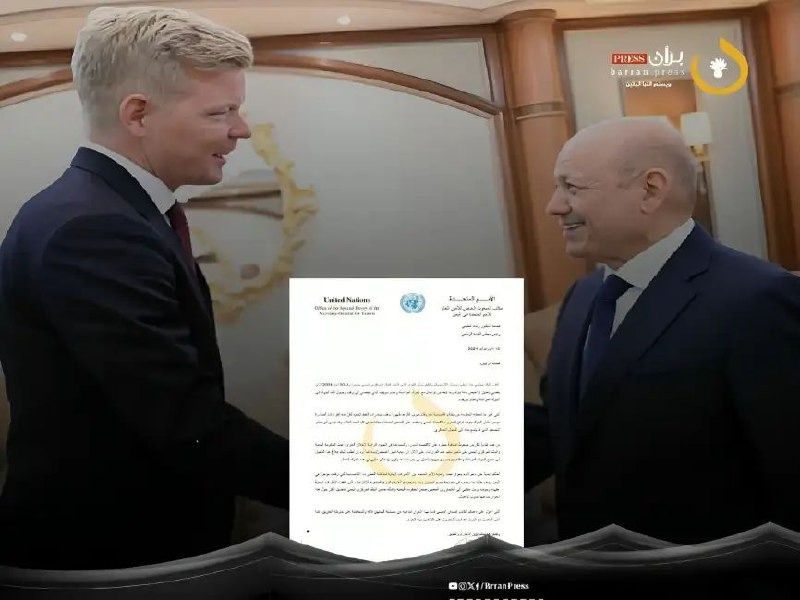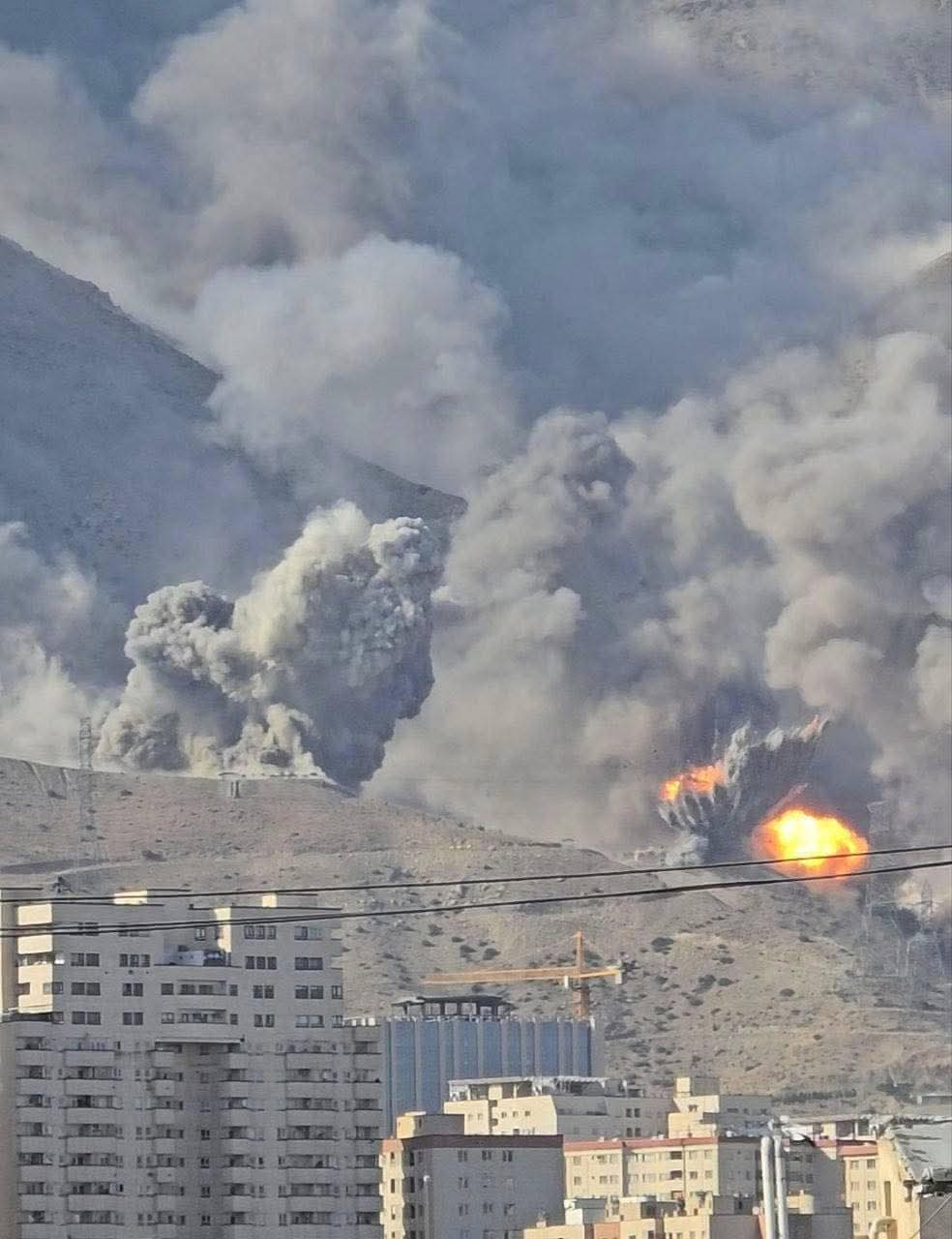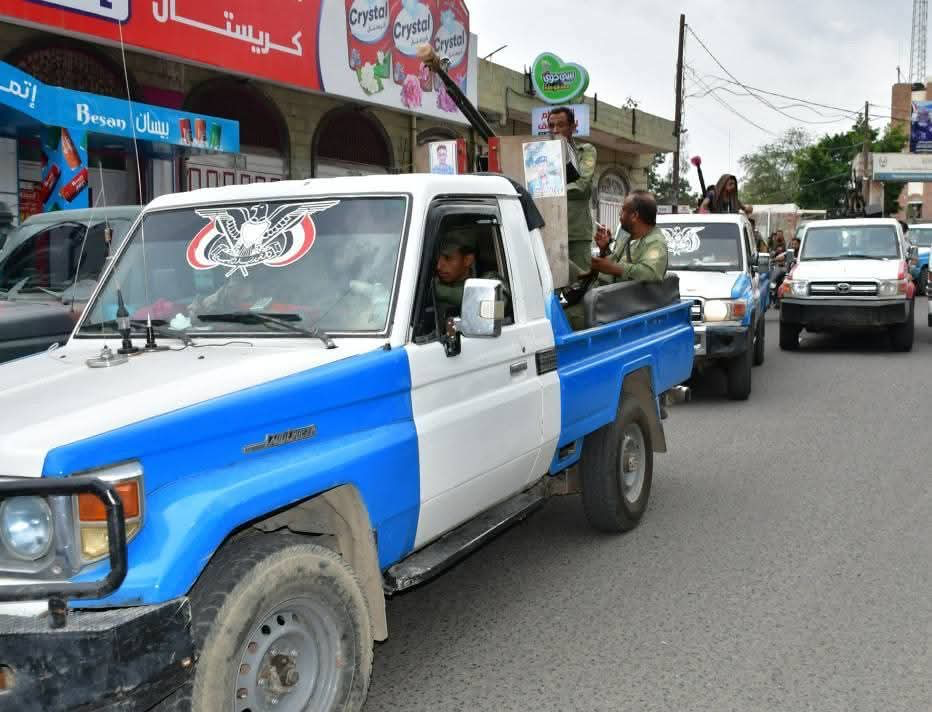
Barran Press
A letter from UN Special Envoy Hans Grundberg to Yemen's Presidential Leadership Council, urging the postponement of recent decisions by the Yemeni Central Bank, has ignited widespread anger among Yemenis. The letter has been met with strong warnings against acquiescing to its demands.
The Yemeni people were initially taken aback by an "emergency" meeting, as reported by the official Yemeni news agency Saba, which brought together the President and members of the Presidential Leadership Council. The purpose of the meeting was to discuss a response to the UN's request to delay the implementation of the Central Bank's decisions and initiate dialogue on economic issues under UN auspices.
While the Presidential Council reiterated its commitment to a "clear agenda for participation in any dialogue on economic issues," with conditions including the resumption of oil exports, unification of the national currency, and the revocation of all arbitrary measures against the banking sector and business community, Yemeni activists perceive this as a retreat from economic decisions that had, for the first time, forced the Houthis into a defensive position.
"Barran Press" has monitored social media commentary from politicians, economists, media personalities, and activists, expressing widespread anger at the "UN envoy's persistent attempts to rescue the Houthis." They warn the Presidential Leadership Council against complying with the envoy's request and reversing the Central Bank's decisions.
A Warning Against Repeating Past Mistakes
Presidential advisor Yassin Makawi views the UN envoy's request as part of a pattern of "vague messages, promises, and pressure" exerted on the presidency and government delegation in 2015 and 2018, and now on the Presidential Council and government under the guise of humanitarian concerns and economic risks, to initiate economic dialogue as outlined in the envoy's memorandum.
In a post monitored by "Barran Press," Makawi urged the President and members of the Presidential Leadership Council to "learn from the disasters of the economic truce and the Stockholm Agreement," warning against repeating these "errors" as they directly affect the last pillar of the state's legal framework and legitimacy, potentially undermining it in favor of bolstering the legitimacy of the Houthi terrorist group's coup.
He asserted that "we have all experienced these pressures and illusory promises, and war is war. The Presidential Council and the government must utilize all means, military or economic, to force the enemy, even if it takes time, to return to the table for comprehensive consultations or negotiations." He emphasized that "the political table must be complete, not fragmented as some would like to pass it off piecemeal."
A Legal Violation and Deception
Former Minister of Administrative Affairs, Abdulraqib Fath, considers the envoy's actions to be "outside the scope of his mandate as defined by Resolution 2216, a departure from the authority of his assignment, and therefore a violation of his mandate." He stressed that "the envoy's intervention in matters beyond his mandate constitutes a violation that the legitimate government should reject and inform the envoy accordingly."
In a post monitored by "Barran Press," Fath stated, "When the internationally recognized legitimate government exercises its right to defend the homeland and its citizens, setting limits on the barbarity of the militias and their actions, we find those claiming to represent state values and the rule of law moving to restrict the actions of the legitimate government under the banner of assisting the Yemeni people and the importance of peace, the UN Secretary-General's representative being a prime example."
He added, "Reliable information indicates the Presidential Council's support for the bank and its unwavering stance against any retreat from these decisions. The Houthi militias must realize that the economic battle is active and there will be no backing down," noting that "there is an organized deception being carried out by Houthi mouthpieces and their supporters regarding the Presidential Council's alleged freezing of the Central Bank's economic decisions."
Unreasonable interference
Eshraq Al-Maqtri, a human rights activist and member of the National Commission for Investigating Human Rights Claims, accused the envoy of consistently siding with the Houthis. "Every time the legitimate government takes a political, economic, or military decision, or gains a stronger position, the envoy rushes to stop it, applying pressure, issuing statements, and making visits," she said in a post monitored by Barran Press. "Yet, he remains silent and submissive to any security, military, or economic escalation by the Houthi group that undermines the rights, dignity, and safety of Yemen and Yemenis."
Al-Maqtri criticized Grundberg's latest move, claiming his intervention is presented as humanitarian but will ultimately harm Yemenis. "Sadly, there is nothing worse than what the poor and victims of Yemen are experiencing today," she added. "There is no worse situation than this."
She pointed out that the envoy and his team are fully aware of the inhumane and unnatural situation in Yemen, particularly in recent years. "The situation has reached a point where even local and international humanitarian and development organizations are affected by the confiscations, looting, and arrests by the Houthis," she said.
Al-Maqtri argued that the UN intervention should focus on preventing the strengthening of one party and allowing people to claim their rights from those who violate them, including economic rights. "It should not contribute to their economic support and weaken citizens," she stated.
A Rescue for the Houthis After Long Silence
Journalist Abdulrahman Anis highlighted several instances where the UN envoy remained silent despite blatant Houthi actions. He pointed out the envoy's silence on the Houthis' prevention of the legitimate government from exporting crude oil for over two years, as well as their economic war on the government that drove the dollar exchange rate to 1890 riyals.
Anis also criticized the envoy's silence on the Houthis' prohibition of the national currency circulation, leading to a monetary split, and their violations against the banking sector, including the arrest of administrative leaders of private banks and the installation of pro-militia administrations.
After all this silence, Anis said, Grundberg rushed to save the Houthis from the decisions of the internationally recognized Central Bank. He also recalled how the envoy's predecessor, Martin Griffiths, intervened to save the Houthis from losing the city of Hodeidah and its port in 2018. "If America and the international community had not been so lenient, the Houthis would have been gone years ago," he asserted.
Alimi: The Envoy and His Tools Are Not "God"
Journalist Ali Al-Faqih, in a post accompanied by the UN envoy's letter to the Presidential Leadership Council, wrote, "They will use this letter as a lubricant to push through the foreign will to cancel the Central Bank's decisions." He added, "Alimi and the Council of Eight, the UN envoy and those working for them are not 'God'. Any retreat is a disgrace on your faces, none other."
Researcher and journalist Hamdan Al-Alii stated that "soft tools" remained silent in the face of a vast number of Houthi economic crimes targeting the national economy and exacerbating the suffering of Yemenis. "When the state fulfilled its duties in confronting Houthi chaos, these soft tools started screaming again, repeating the same record they used to stop the liberation of Hodeidah."
Journalist Saleh Al-Baydhani emphasized that any UN efforts to persuade the legitimate government to reverse the decisions taken by the Yemeni Central Bank in Aden should be preceded by securing the Houthis' agreement to reverse their unilateral actions over the past years.
Al-Baydhani referred to the Houthis' unilateral actions as including the prevention of the circulation of currencies issued by the Central Bank in Aden, and the establishment of Houthi customs and tax checkpoints on the lines of contact between liberated governorates and those under the militia's control.
To Alimi: The Envoy is Not the "God"
Saif Al-Hadhary, publisher of the local newspaper "Akhbar Al-Yawm," considers any retreat or even a temporary suspension of the Central Bank's decisions a "defeat with serious repercussions for all economic, political, and military tracks." He argues that the government must take necessary steps to stabilize the currency and address the payment deficit, emphasizing the urgent need to resume oil exports. Al-Hadhary warns against succumbing to the demands of the UN Special Envoy.
Journalist Mohammed Mahdi launched a scathing attack on the UN envoy, accusing him of inaction during the looting of billions of dollars and throughout the Houthi's oppression of the Yemeni people. He claims the envoy has consistently obstructed efforts to liberate Yemen under the guise of humanitarian concerns, and that his current intervention is merely another attempt to rescue the Houthis from any decision that could harm them. He blames the Presidential Leadership Council for any retreat from the Central Bank's decisions, warning that the Yemeni people will hold them accountable.
Activist Ahmed Al-Abab also directed his criticism towards the UN envoy, questioning his whereabouts and actions during the Houthi attacks on oil resources that halted exports. He accuses the Houthis of imposing exorbitant fees on transfers, closing bank accounts, and establishing checkpoints to collect taxes. He further alleges that the Houthis have printed counterfeit currency and seized companies, including Modern Pharma and Global Pharma. Al-Abab argues that the envoy's pressure on the government only benefits the Houthis and allows them to continue stealing from the poor. He urges the envoy to focus his efforts on pressuring the Houthis to reverse their actions and stop their violations.
The Central Bank's decisions, including the revocation of licenses for 26 exchange companies and the closure of their branches, were taken following previous measures to implement a unified domestic remittance network, ban transactions with 12 unauthorized electronic payment entities, and cease operations of local remittance networks owned by banks or exchange companies. In May, the Central Bank also ordered the suspension of transactions with six banks and issued a directive for individuals and businesses to deposit old currency before 2016 within 60 days.
The debate surrounding the Central Bank's decisions highlights the complex and volatile situation in Yemen. The government faces a difficult choice between taking decisive action to stabilize the economy and potentially escalating tensions with the Houthis, or yielding to pressure and risking further economic instability and undermining its authority.





